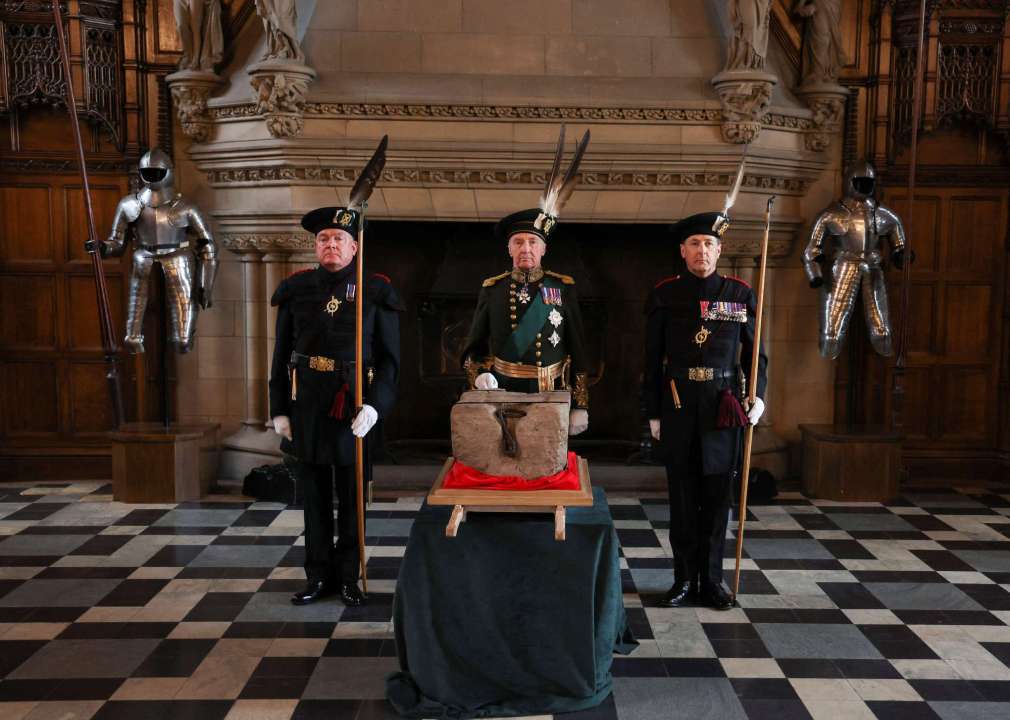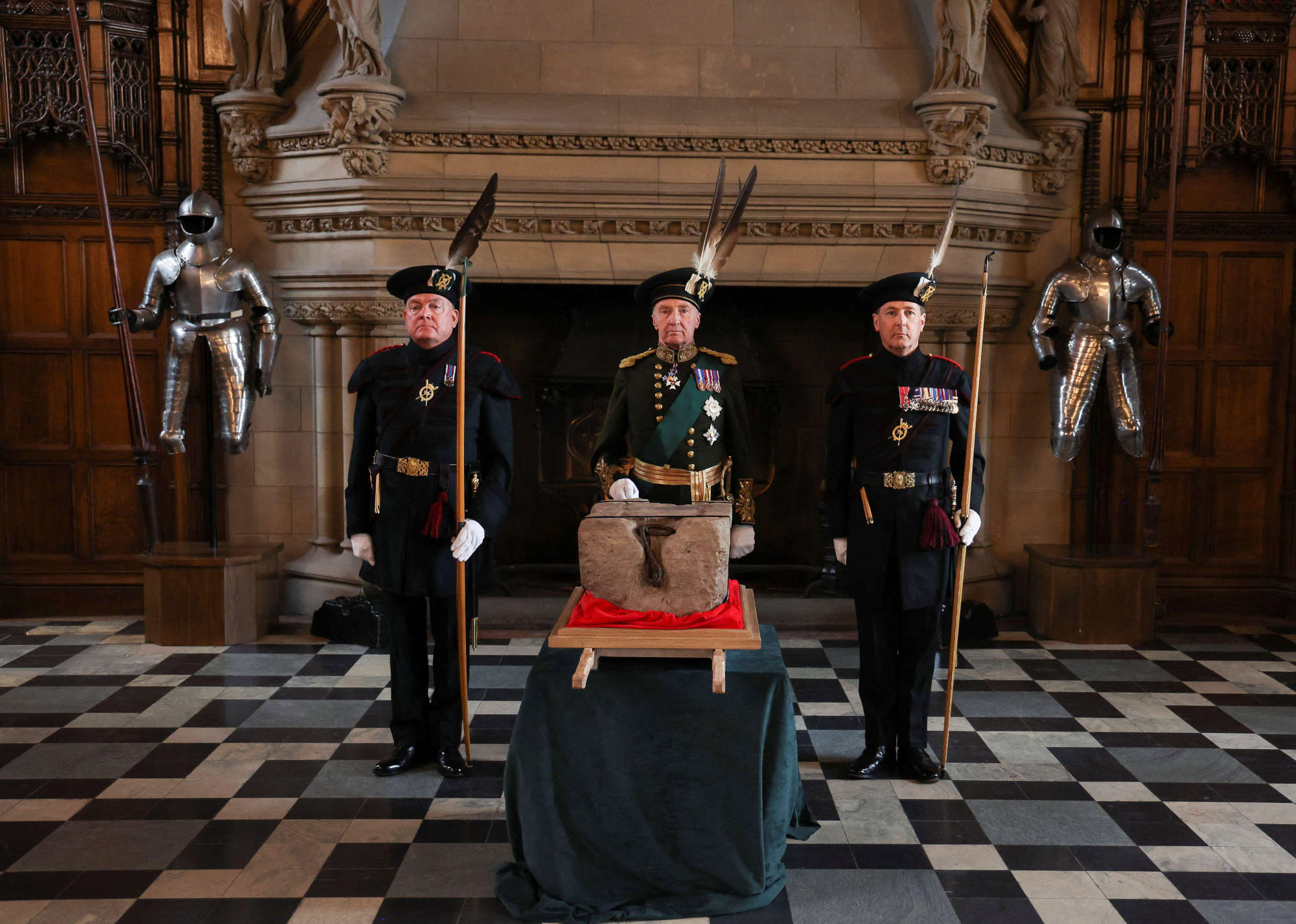Claims of financial skulduggery abound, Nicola Sturgeon is politically hors de combat and Humza Yousaf is quickly rebranding the SNP as a party not only of shatteringly incompetent government but also of lost causes, political irrelevance and sheer kookiness. Thinking Scots who don’t fancy the Tories might be forgiven for contemplating a switch of loyalties to Alex Salmond. His new party Alba, formed in 2021, might be a bit rough round the edges, but at least it looks principled. There is an attraction in the straight-talking face of nationalism past, with no pretence to either elegance or middle-class faddishness: witness Salmond’s bon mot on LBC a couple of days ago about the Stone of Scone (‘I know it’s just a lump of rock, but it’s our lump of rock’) which has a comforting directness that would never have come from either Sturgeon of Yousaf.
Bien-pensant Scots should nevertheless think again. Behind the scenes, the Salmond they remember, and the party he now leads, have morphed into something rather unattractive.
Take Alba first. True, it has rightly disowned some of the idiocies of the SNP, such as its quixotic push to use the courts to force through gender self-identification, or its plan to close off large areas of the sea to fishing as an exercise in green virtue-signalling. But a quick look at its other policies suggests pretty quickly that even if, impossibly, it were in power right now, life in Scotland would not be very different from what it is at present.
The vaguely left-wing mantras that got the SNP its support in sleek urban villages like Bruntsfield and Glasgow’s West End appear here too, albeit dressed up slightly differently. Alba’s health policy is based on vague promises to reduce inequality. Its prescription for the dire state of Scottish education is, it seems, to get rid of the over-supply of unemployed teachers by removing the present system which, it sniffily says, ‘allows anyone with a degree to take a short one-year course and be on par with a person with a Masters of Education.’ In other words, it wants to appease the teaching unions by restricting entry to the profession.
Anyone earning over £70,000 a year would be even more heavily taxed than under the SNP (which has already caused a brain drain to England by its fiscal policy). There would be a new top rate of 50 per cent (compared to 45 per cent south of the Tweed) and a VAT rate of 40 per cent – yes, 40 per cent – for ‘high end designer fashion, jewellery, and cars’. This will, presumably, be backed up by large border posts to prevent smuggling from England. Alba’s energy policy is to eschew nuclear, give ‘the people’ a ‘public share in our vast offshore wind wealth,’ and launch a massive hemp-growing campaign.
Alba too wants to rejoin the EU – it engagingly if unconvincingly reassures us that ‘there is unlikely to be much opposition within the member states.’ It dislikes Nato membership and (disconcertingly) its ritual condemnation of Russia’s invasion of Ukraine is immediately followed by a less than convincing solution of a ‘renewed drive to secure the peace led by the United Nations.’
So much for the party. Salmond himself, however, is also changed. Gone is the staunch royalist whose demands for independence under the Crown were reminiscent of those of the nineteenth-century Irish Home Rulers until the hard men took over after 1914. Salmond is now it seems a new-style left-wing republican: as he said on TalkTV last week, ‘We’re in the 21st century, a democratic age, the monarchy is the pinnacle of a class system, and you’d want to sweep that away.’
Most disturbing, however, is that he now seems willing, at least in principle, to use something more than persuasion to obtain independence. On Monday this week, following the less than dignified temporary transfer of the Stone of Scone from the Crown Room at Edinburgh Castle to Westminster Abbey for the coronation, he dismissed Humza Yousaf as a ‘pet poodle’ for physically allowing it to leave and said that had he been in power he would have ordered Police Scotland forcibly to prevent the operation.
This was a one-off outburst, but it was clearly considered and it should worry us intensely. Police Scotland, constitutionally independent like any police force, takes operational orders from no one in government – not even the King can order it about. For Alex Salmond to suggest that a mere First Minister could or should have used that body to create a ‘stand-off’ preventing the Crown exercising the legal rights it has over the Stone of Scone is supremely irresponsible. Not only would this have put the police under political direction: it would also have risked possible violence and would have been hard to reconcile with its officers’ oaths to ‘faithfully discharge the duties of the office of constable.’
And that is quite aside from the problems inherent in using the force of the state, in the shape of the police, to oppose the actions of an elected government. The independence cause in Scotland gains what respectability it has from its principled stance of pressuring London intensely while observing the constitutional niceties: Alba and Salmond are in peril of injecting a dangerously fanatical and anti-democratic element into the nationalist case.
To his credit, Humza Yousaf has played this episode absolutely right. He has rightly called out this suggestion from Salmond as improper. And, staunch republican though he is, he will attend the coronation. For this at least the Scots have some reason to be grateful to him. Meanwhile they need to realise that, whatever the answer may be to the independence riddle, Alex Salmond and the Alba party have no decent claim to be part of it.
Join The Spectator's Fraser Nelson, Katy Balls and guest Camilla Tominey from the Daily Telegraph for a special edition of Coffee House Live covering what kind of monarch Charles III will be, and whether the coronation will distract voters from the Tories’ predicted heavy losses in the local elections. 10 May from 7pm. Book your tickets today: spectator.co.uk/coronation







Comments